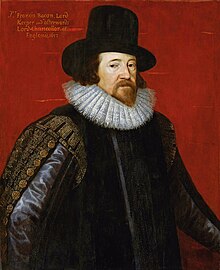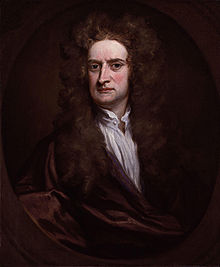Naučna revolucija
Naučna revolucija je bila niz događaja koji su obilježili nastanak moderne nauke tokom ranog modernog perioda, kada su razvoji u matematici, fizici, astronomiji, biologiji (uključujući ljudsku anatomiju) i hemiji transformisali poglede društva na prirodu.[1][2][3][4][5][6] Naučna revolucija se dogodila u Evropi u drugoj polovini renesansnog perioda, sa publikacijom Nikole Kopernika iz 1543. godine De revolutionibus orbium coelestium (O revolucijama nebeskih sfera) koja se često navodi kao njen početak.[7]
Doba naučne renesanse se u određenoj mjeri fokusirala na obnavljanje znanja starih ljudi i smatra se da je kulminirala u publikaciji Isaka Newtona Principia iz 1687. godine koja je formulirala zakone kretanja i univerzalne gravitacije,[8] čime je dovršena sinteza nova kosmologija. Naknadno doba prosvjetiteljstva je vidjelo da se koncept naučne revolucije pojavio u djelu Jean Sylvain Bailly iz 18. vijeka, koji je opisao dvofazni proces brisanja starog i uspostavljanja novog.[9] I dalje postoji naučni angažman u vezi sa granicama naučne revolucije i njenom hronologijom.







Reference uredi
- ^ Galilei, Galileo (1974) Two New Sciences, trans. Stillman Drake, (Madison: Univ. of Wisconsin Pr. pp. 217, 225, 296–67.
- ^ Moody, Ernest A. (1951). "Galileo and Avempace: The Dynamics of the Leaning Tower Experiment (I)". Journal of the History of Ideas. 12 (2): 163–93. doi:10.2307/2707514. JSTOR 2707514.
- ^ Clagett, Marshall (1961) The Science of Mechanics in the Middle Ages. Madison, Univ. of Wisconsin Pr. pp. 218–19, 252–55, 346, 409–16, 547, 576–78, 673–82
- ^ Maier, Anneliese (1982) "Galileo and the Scholastic Theory of Impetus," pp. 103–23 in On the Threshold of Exact Science: Selected Writings of Anneliese Maier on Late Medieval Natural Philosophy. Philadelphia: Univ. of Pennsylvania Pr. ISBN 0-8122-7831-3
- ^ Hannam, p. 342
- ^ Grant, pp. 29–30, 42–47.
- ^ Juan Valdez, The Snow Cone Diaries: A Philosopher's Guide to the Information Age, p 367.
- ^ "PHYS 200 – Lecture 3 – Newton's Laws of Motion – Open Yale Courses". oyc.yale.edu.
- ^ Cohen, I. Bernard (1976). "The Eighteenth-Century Origins of the Concept of Scientific Revolution". Journal of the History of Ideas. 37 (2): 257–88. doi:10.2307/2708824. JSTOR 2708824.
Literatura uredi
- Burns, William E. The Scientific Revolution in Global Perspective (Oxford University Press, 2016) xv + 198 pp.
- Cohen, H. Floris. The Rise of Modern Science Explained: A Comparative History (Cambridge University Press, 2015). vi + 296 pp.
- Grant, E. (1996). The Foundations of Modern Science in the Middle Ages: Their Religious, Institutional, and Intellectual Contexts. Cambridge Univ. Press. ISBN 978-0-521-56762-6.
- Hannam, James (2011). The Genesis of Science. Regnery. ISBN 978-1-59698-155-3.
- Henry, John. The Scientific Revolution and the Origins of Modern Science (2008), 176 pp
- Knight, David. Voyaging in Strange Seas: The Great Revolution in Science (Yale U.P., 2014) viii + 329 pp.
- Lindberg, D.C. The Beginnings of Western Science: The European Scientific Tradition in Philosophical, Religious, and Institutional Context, 600 B.C. to A.D. 1450 (Univ. of Chicago Press, 1992).
- Lyons, Martyn (2011). Books: A Living History. Los Angeles: The J. Paul Getty Museum. ISBN 978-1-60606-083-4.
- Pedersen, Olaf (1993). Early Physics and Astronomy: A Historical Introduction. Cambridge Univ. Press. ISBN 978-0-521-40899-8.
- Sharratt, Michael (1994). Galileo: Decisive Innovator. Cambridge: Cambridge University Press. ISBN 978-0-521-56671-1.
- Shapin, Steven (1996). The Scientific Revolution. Chicago: Chicago University Press. ISBN 978-0-226-75020-0.
- Weinberg, Steven. To Explain the World: The Discovery of Modern Science (2015) xiv + 417 pp.
- Westfall, Richard S. Never at Rest: A Biography of Isaac Newton (1983).
- Westfall, Richard S. (1971). The Construction of Modern Science. New York: John Wiley and Sons. ISBN 978-0-521-29295-5.
- Wootton, David. The Invention of Science: A New History of the Scientific Revolution (Penguin, 2015) . xiv + 769 pp. ISBN 0-06-175952-X
Vanjski linkovi uredi
- Naučna revolucija na Wikimedia Commonsu